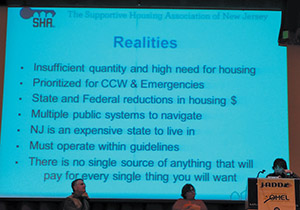
Tenafly—To mark Jewish Disability Awareness Month, NJ service agencies gathered to present a free special “How-To-Access What You Need” conference for parents and caregivers of special needs people who must cope with the bureaucracies at government agencies. The session took place at the Kaplen JCC on the Palisades last Sunday. OHEL, J-ADD, and the JCC on the Palisades were the major sponsors and created the program after their separate agencies discovered mass confusion among those who needed services the most. The purpose was to present information about the changes at the Department of Human Services and the Department for Disabilities and tell the public how to navigate the system and inform them about coming changes.
“The times are changing very, very quickly, with the information we see [indicates] we need to provide the role of advocate,” said Shelley Levy, Director of the Guttenberg Center for Special Services at the Kaplen JCC. “It becomes even more complex as children age into adulthood. When parents no longer have the school as the anchor, the parents have to do this work on their own and become their own advocates.”
Senator Loretta Weinberg, who was to open the conference, was absent due to illness, so keynote speaker Elizabeth M. Shea, assistant commissioner of D.H.S., explained why the changes are necessary. Basically, the system is squeezing 30 years of needed reforms into three years, because too many people have been underserved.
Shea explained “If someone came to us and said—and we’ve had this happen—‘Look, I need a little bit of respite, I need a little bit of income support and I’ll be fine. That’s what I need. That’s what my family needs to get through this period.’ For a long time the answer was ‘We don’t really have that. We have group homes or we have one or two options’ and that was it. … The reforms that we’re making now are tailored to get to a place where we can serve more people. Provide them with what they actually want at the appropriate levels.”
Many attendees expressed frustration with the lack of much-needed services for their loved ones. David, father of an adult son with developmental disabilities, shared his. “The ones who need services often have the most difficulty getting them.” He added, “What do you do with people who can’t function in the real world? All they need is a little bit of help.”
“Any opportunity to inform people how to navigate through the maze is incredibly worthwhile,” added Abbe Greenberg of Bright Path Consulting.
The conference attendees came from across the religious and racial spectrum. Despite winter storm warnings over 200 people pushed through the frigid air and wind to attend.
Sponsors also found that housing issues were one of the most important areas of interest. The housing panel decided that they had to continue conferences in order to see how the problems can be solved. There were several workshops for attendees covering such topics as employment, SSI/Medicaid eligibilities, advocacy for parents, and life-care planning and support.
The workshops provided helpful recommendations to maximize what the system has to offer. In her workshop on how parents can advocate for youth transitioning out of the teenage years, Theresa Herrero-Taylor, PhD, BCBA-D, suggested people become more aware of how the legal system can be an asset for them. “Parents are unaware of the laws when advocating for their children. The most common way people give up their power is by thinking they don’t have any.” One mother added her own experience, saying, “the squeaky wheel gets the grease” in describing her vocal efforts to obtain speech therapy for her son.
On a related note, Levy explained, “If you’re not Medicaid-eligible then you have a harder time acquiring services.” She also stressed, “Parents have to plan 10 years in advance. It’s up to our agencies to guide the parents and provide opportunities to the younger and older adults who should have access to services, including life planning and support.”
Attendees agreed that there have long been great challenges in obtaining appropriate services, but there is also great hope and promise that the system is changing for the better, that families will have an easier time locating and obtaining the kind of assistance their loved ones need.
“I feel that we accomplished a beginning because it tells us how much work there is to do. We certainly accomplished what we set out to do. There is a lot more that we need to be doing for people,” said Dr. John Winer, executive director at J-ADD. Future conferences may want to include a focus on how caregivers can care for their own health.
Partnering with the event sponsors were JFS of Clifton-Passaic, Sinai Schools, JESC, JFS of North Jersey, JFS of Bergen and North Hudson, Jewish Federation of Northern New Jersey, Bergen County Y/JCC, and Bright Path Consulting.
By Allyson Gur-Aryeh and Shoval Gur-Aryeh, PhD










